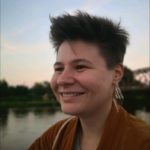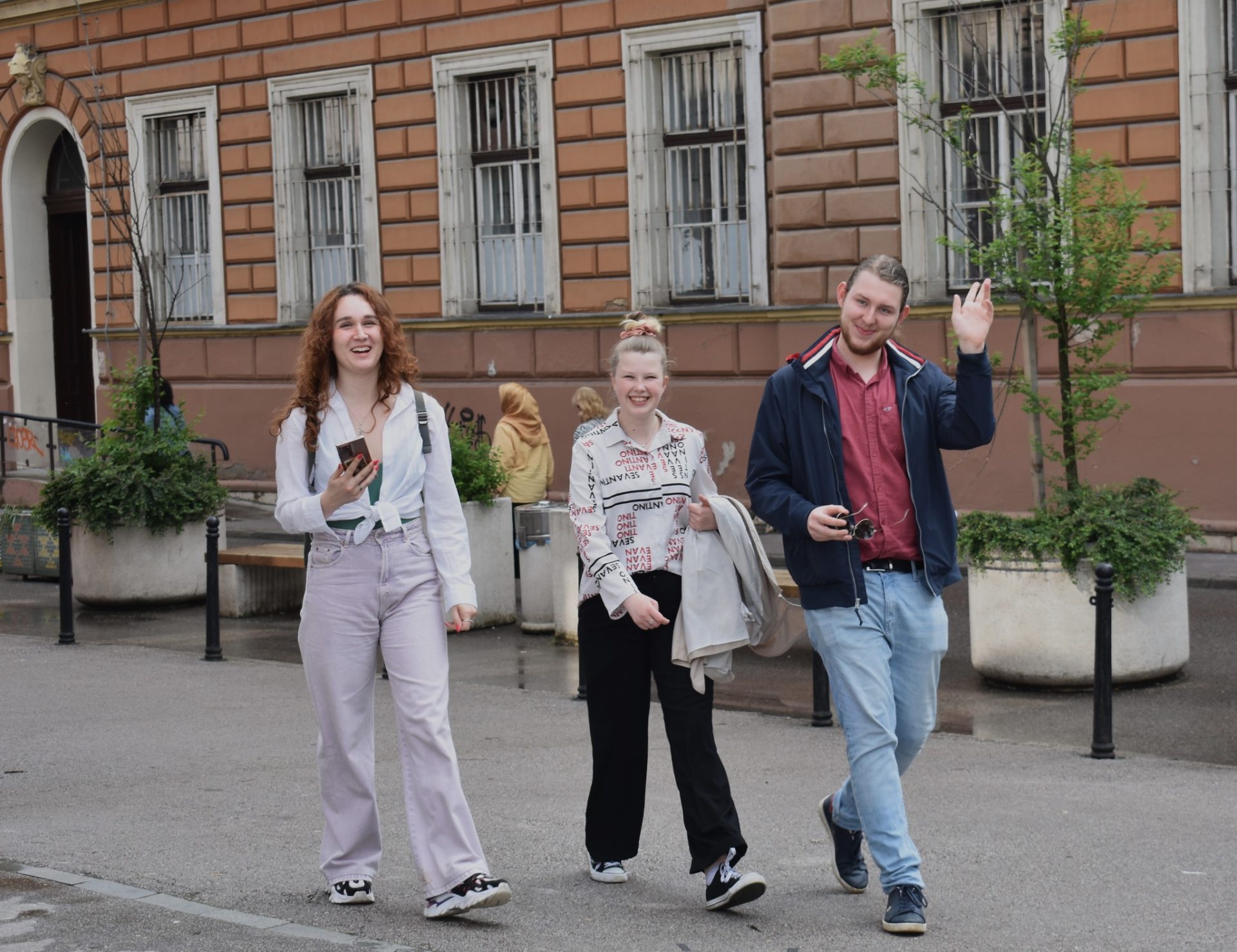
Peace education activists in Bosnia-Herzegovina (BiH) are facilitating dialogue in a political environment that is far from hospitable to their work.
Bosnia’s education system, partitioned into 13 different education ministries with no unified curriculum, is a breeding ground for division and ethno-nationalist narratives rather than fostering integration (Pašalić-Kreso 2023, 47; Komatsu 2021, 521). What motivates peace education activists and keeps them going to contest these divisions? In my conversations with them, three activists from BiH shared their perspectives on the structural obstacles to their work, how they navigate those, and which changes they would like to see.
Working around systemic barriers
“We’re sort of the troublemakers. We’re trying to change the status quo”, says Samira Baručija about her work. Baručija is a regional coordinator for the United Religions Initiative (URI) Multiregion, a network of NGOs for interfaith cooperation. She has been an activist at Youth for Peace, an organization working on topics not covered in Bosnia’s formal education system, for ten years. Youth for Peace’s projects, she explains, are primarily about furthering young people’s critical thinking skills surrounding peace, reconciliation, and justice. The projects set out to achieve this by talking about topics such as narrative deconstruction and identity.
Young people are motivated to participate in Youth for Peace’s out-of-school workshops and seminars, Baručija asserts: “Young people are craving what we are offering. They are in desperate need to hear a different perspective on the lives that their parents and their families have had, and they feel stuck”. On a political level, Baručija sees more obstruction than support for their projects in both the Federation of Bosnia and Herzegovina (FBiH) and the Republika Srpska (RS), the two entities of Bosnia. She recounts that, while Youth for Peace has tried to cooperate with the formal education system, “when you come to any school or a ministry of education, and you say, hey, we’d like to help your students to rethink what you’re teaching them, and to offer them a different perspective, that’s a big no-no.”
One successful collaboration on a joint project between two mono-ethnic schools, she says, only took place because of personal contacts between Youth for Peace staff and some of the schools’ teachers. Outside of this project, “even though we wanted to work with schools, we have not had the most success reaching out to them. So that’s not a piece of the society that we can fight for anymore. What we can do is get young people outside of these echo chambers and bring them to spaces where they can have genuine dialogue.”
Baručija says that despite young people being “incredibly eager to participate no matter where they’re coming from”, there are proportionally fewer people applying from the Republika Srpska. “It would be so much easier if we had partners in Republika Srpska who were able to recommend their participants for some activities,” she says. While it may not be easy to find a cooperative organization in the RS, Youth for Peace has partnered with one organization from Prijedor (RS entity): “There are still organizations that are trying to resist and fight and provide spaces for their members.”
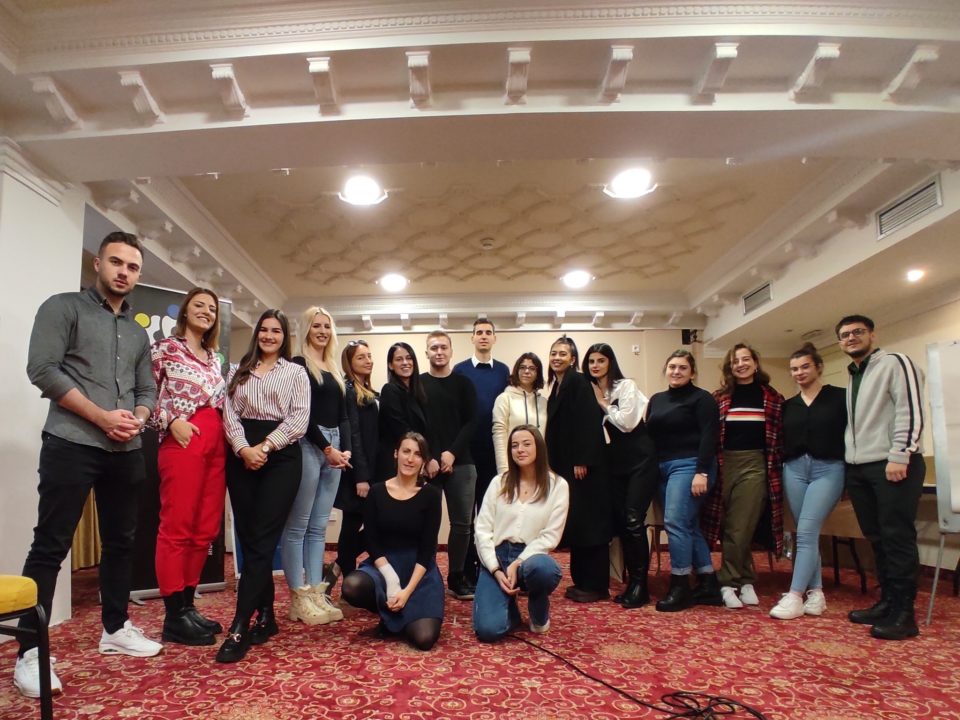
Dejan Rađen is a youth work coordinator at PRONI Center for Youth Development, an organization located in Brčko District, which is a self-governing administrative unit in Bosnia. PRONI’s peace education programs include conflict resolution projects and training for community leaders. Rađen says his organization has found ways to engage with the separate entities: “We are working with one of the ministries in the Republic of Srpska on a youth strategy and action plan for them, and at the same time, we are working with some of the cantons and federal ministries in the Federation. And also, we are, of course, working in Brčko.” When it comes to the implementation of peace education projects, Rađen says that his work is usually not negatively impacted by the political environment in Bosnia, “only when we don’t have support from the authorities when we need it, for example regarding some European projects that they are obliged to do.”
He explains that receiving financial support mainly from sources outside of the Bosnian state helps keep PRONI independent: “98%, 99% of our budget are from donors outside of the Bosnian government, embassies and other international organizations, stuff like that. So we don’t depend on them, but we want to work with them. And for some projects, we need their support, maybe not financial, just: be at the meeting, please sign this, and so on.”
His organization’s projects focus on the future rather than the past, Rađen says: “What we do in our core is peace-building, but not in terms of dealing with the past. Mostly, we believe for peace to come, new generations need to come, generations need to switch. We try to influence as many young people as we can to be more open-minded.”
Working as agents of change in Bosnia means operating in a rigidly divided political environment: “The system was made to separate everything. The school system is divided, the health system is divided, traveling is divided; basically, everything is divided.” Rađen attests that COVID has furthered these divisions; since the pandemic started, not only did fewer people apply to PRONI’s projects, but a decline in applications has been particularly noticeable from people living in the RS entity. The reasons for that, Rađen says, are multifaceted: “Of course, there are a lot of examples of young people who are open to being active, but for the most part, it’s not very popular in Banja Luka or Republika Srpska in general to be part of an NGO and to be involved.”
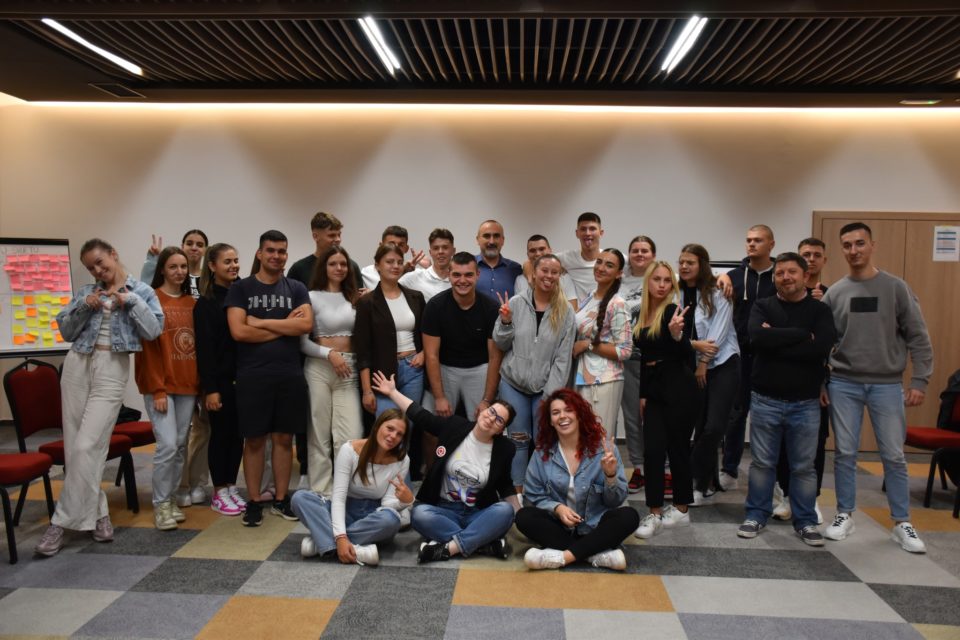
Cases of corruption in NGOs working in the RS are one of the factors, Rađen argues, that leads to NGOs being looked upon with suspicion. Furthermore, in September 2023, the government of the Republika Srpska proposed a law that would have led to any NGO receiving international funding being labeled as foreign agents (Kurtic, 2023; ibid., 2024). Although the law has since been withdrawn, NGOs are now more easily perceived as foreign agents by the general public, says PRONI’s Rađen. He speculates that the media portrayal of NGOs in the RS is contributing to the decline in applications. “In Sarajevo, it was never not cool to be part of an NGO. It means that you are active, you travel, you meet people. In Banja Luka [RS entity], it’s not like that. The general public is not well informed about NGOs, and they are unsure about the unknown. That’s how I see it.”
Dealing with stereotypes and hate speech in class
Vladimir Andrle is the president of the Jewish cultural-educational and humanitarian society “La Benevolencija”. His organization’s educational programs include projects at schools in different parts of the country and open-door activities on the premises of the Jewish community. At schools, Andrle and his colleagues are educating Bosnia’s youth about “topics such as hate speech, antisemitism, Islamophobia, Christianophobia and all kinds of other forms of xenophobia.” Additionally, La Benevolencija has programs on education about the Holocaust and Holocaust denial. Andrle attests huge gaps in Holocaust education in Bosnia: “Even teachers don’t truly understand what the Holocaust was and how the Holocaust happened. In school books, the Holocaust is part of the one or two lessons on the Second World War. So, over the course of the whole education of one child, they are talking about the Second World War and the Holocaust for only one and a half hours in total.”
When students make antisemitic statements, these often directly reflect a lack of knowledge combined with stereotypes and misinformation spread through the media, he believes. Andrle, therefore, sees a need to work with not only the students but also the adults around them: “There are much bigger problems than the kids. We are currently in the process of revising our project on Holocaust education. We want to work with the teachers, the principals of the schools and with the parents of the children to turn them into agents of change.”
Baručija from the URI notes that, at school, “students are not even being taught history, they’re being taught narratives. So we try to teach them how to deconstruct these narratives and figure out where all this came from.” She reports that young people reproduce these narratives during Youth for Peace’s activities: “Sometimes they share random fake news they heard. And then sometimes participants say things that are quite damaging, hurtful and harmful to an entire group or a wider context.” Nevertheless, Baručija sees such instances as valuable opportunities: “Some of these statements are outright insulting to us as facilitators as well, but that does not mean that we’re going to attack them or remove them from a workshop. If such a moment shows up during a workshop, I would say that’s a golden goose. It’s a moment you can transform into a lesson for everyone. We can provide an individual an opportunity to reconsider what they just said, offer them an alternative in some way, shape or form.”
Baručija says that additional activities help create bonds between people, bonds that can also prevent conflict escalation: “We almost always prepare programs for the evening. We gather, sing, hang out, whatever. We do something just to maintain that group cohesion and for them to get to know each other. It’s really hard to hit someone or to wish them a bunch of bad things when you really know them, when you spend so much time with them and so on. And, if anything does happen, people do not judge you as hard because they sort of know another side of you. So it’s never just about the workshop session.”
Andrle agrees that getting to know people can help: “It’s all about people meeting people. Kids have a picture of ‘the Jew’ from propaganda, but most of them have never met a Jew. When they see that they have Jews in their community, in their city, that they are behaving the same and that we have the same needs, the same wishes, then they start to realize that Jews are not those scary people who are controlling everything in the world.” When asked about how he is personally affected by hearing students’ prejudice and sometimes receiving outright hateful comments, Andrle says, “I mean, I’m used to it. In my work I was openly called all kinds of words. Children accused me of being a supporter of the atrocities Palestinians are facing, and it was even said to me that because I’m a Jew, I don’t belong in Bosnia Herzegovina, I should move to Israel. But truly, I don’t mind. It does not affect me because I understand where that comes from; it’s ignorance, it’s false information.”
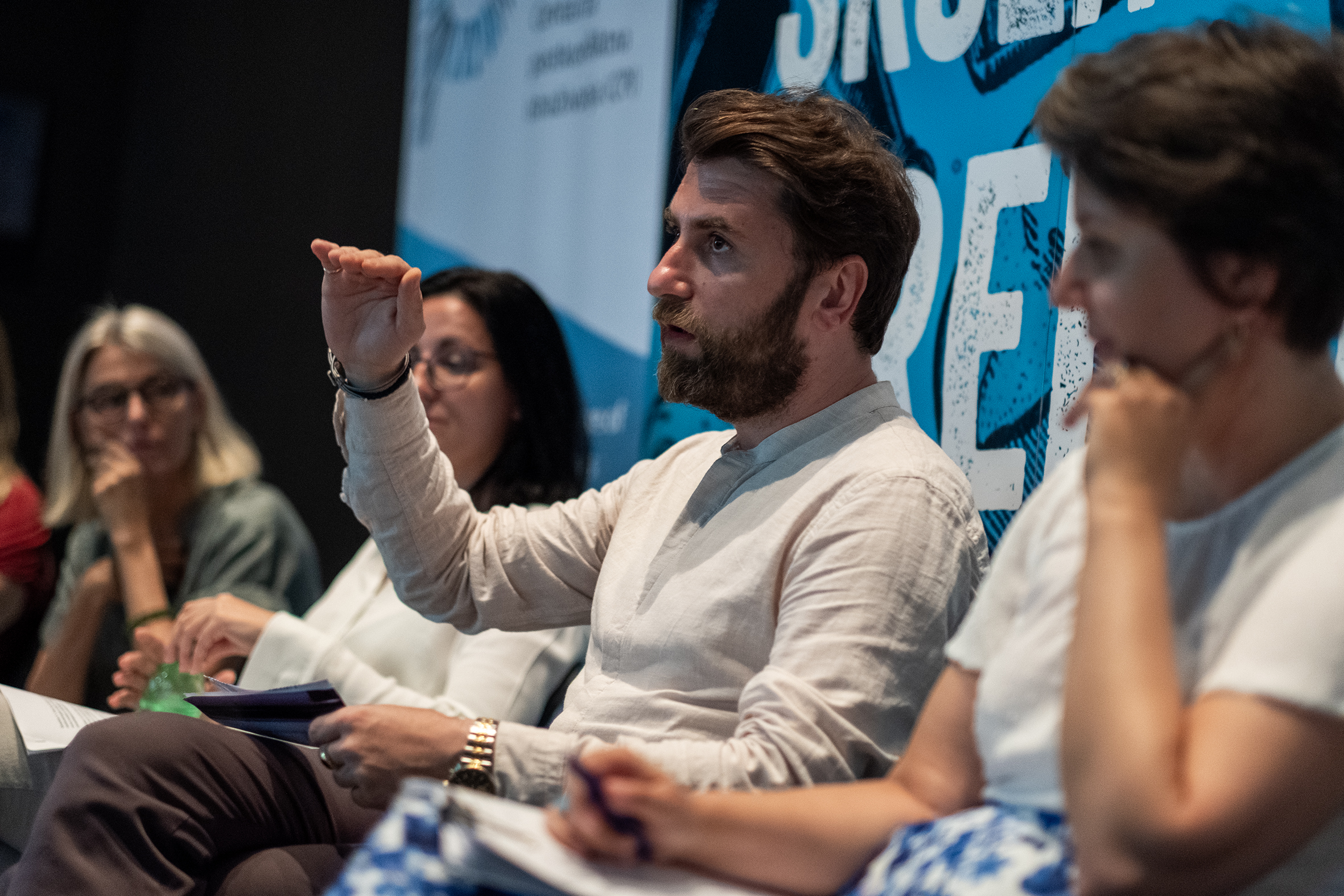
Meanwhile, Rađen says that stereotypes and ethno-nationalist narratives are not topics that are openly discussed in PRONI’s workshops, which focus instead on building a common identity. “We almost never talk openly about differences in religion or nationalism or stuff like that. We focus on similarities, for them to be able to recognize, oh, she likes the same music, she watches the same sport, she likes the same food, we are basically the same. We try to connect them with positive things, not to talk about their differences,” he explains.
Rađen shares Baručija’s view that conflicts which do arise during activities may be challenging to handle but are an opportunity rather than a problem: “Usually when there is conflict, we look at it as a positive thing. And when that happens, it becomes the main focus of the agenda, we sit and talk until we resolve the issue. If nothing happens and everyone is smiling, that means you are doing something wrong.”
On the other hand, Andrle stresses that if students do have prejudices against others, these need to be talked about; otherwise, there is no opportunity to transform their views: “The concept of our educational work is to motivate students to be as honest as they can. You know, we are basically encouraging them by saying, in this lesson it’s okay to be open and to say that you have prejudice. And then we can educate them. People are prone to generalizations, so this is how we are countering these narratives.”
Navigating psychological stress and support systems for activists
Baručija admits that, although activists may not have to fear repercussions from the government, threats from individuals that necessitate police escort do occur. Andrle mentions that he himself recently filed a report to the police for a threat he had received, but feels motivated to keep going rather than intimidated by this incident. He believes that his pragmatic view on dealing with these things reflects the normalcy of trauma in Bosnian society: “We from Bosnia Herzegovina, we are used to stress, we are used to trauma, we are used to these kinds of phenomena because of our history. We are usually only talking about the war from the 90s, but, to tell you the truth, in the last 200 years, there were a couple of wars in the region, so we have this trauma going from generation to generation and especially after this last war, after the aggression on Bosnia Herzegovina and the siege of Sarajevo, we have never received any kind of post-traumatic treatment, neither civilians nor soldiers. When you grow up with this kind of trauma that most of the people in Bosnia Herzegovina are experiencing, even the people born after the war, you are used to it. We are dealing with these kinds of things on our own.”
In Baručija’s experience, the lack of structural support while being confronted with difficult themes and situations as part of their work does take a toll on activists: “Even if you only do this work from time to time, workshop here, workshop there, it is quite demanding.” She reports that, among her colleagues, “most of us are either really close or in severe burnout”. The work itself is not the only factor impacting activists’ mental health: “It feels lonely because, for a lot of us, our families do not support what we do. The entire system is not set up for you to be appreciated and cherished with what you do. So there is a lot to handle there”, says Baručija.
Baručija emphasizes that despite these challenges, she can count on the support of her colleagues. “You never facilitate a workshop on your own. If something that is happening becomes overwhelming at any point, you have someone to lean on. My colleagues and I have worked together for ten years and pretty much grew up together. We have a very close-knit relationship, and we know what sort of skill set we can rely on when it comes to each other.” She says that even though there is no formal requirement by Youth for Peace to do so, “we do reflections after each of the activities as facilitators, within the organization or as colleagues of a few separate organizations.”
Partnerships between organizations, Baručija stresses, also function as support systems. She says that the URI, as an international interfaith network of NGOs, provided this support system for Youth for Peace: “When we founded Youth for Peace, we joined URI the same year. The reason for that was that we felt lonely. It was really hard to navigate everything, and URI provided a network. Now, we rely on resource exchange with other groups at URI, we rely on gaining connections with people around the world.”
She emphasizes that in addition to the support, collaborating with organizations in neighboring countries is necessary for sustainable change: “We cannot work in an echo chamber and consider only beneficiaries from Bosnia and Herzegovina. No matter what happens in one country in the region, it has a way of spilling over to other countries, especially because of a past that is burdened by violence. And so we try to embrace that as much as we can and to partner with other organizations in the Western Balkans.”
Andrle agrees that cooperation between organizations helps create change. His organization is part of the Intercultural Council of Bosnia and Herzegovina, in which the main national Jewish, Bosniak, Serb, and Croat organizations coordinate “common activities like concerts, exhibitions, and seminars on the topic of hate speech. The idea behind this is that we want to show to the population of Bosnia and Herzegovina and to society that we can work together and we must work together. So we are trying to be an example to society in this regard.”
Changes needed to facilitate the work of peace education activists
Financial support from the state in Bosnia’s NGO sector exists, but that support comes with a caveat, Andrle highlights. He explains that most NGOs operating in Bosnia currently “are registered and owned by the people who are part of political parties. Basically, they serve to take the money out of the [NGO’s] budget and to transfer it to certain interests within the specific political party. And this is not limited to a specific political party- every political party is doing that.”
So while there would be enough money for Bosnia’s NGO sector, corruption prevents using these funds for their intended purposes. Andrle instead calls for more local, state, and international support for the existing independent NGOs: “And by support, I mean more than ‘give us money,’ and that’s it. We have to be partners, that is the only way we can turn things around.”
Rađen would like to see the state fulfilling its obligation to work towards collaboration: “It’s not the responsibility of NGOs to give the opportunity to people to travel and meet others. And that’s one of the main peace-building activities, to go to different places and meet different people with different backgrounds.”
While criticizing the dependency of Bosnia and Herzegovina on international support, Baručija says that the international community needs to use its leverage in this regard: “A lot of foreign entities do not work with formal education enough, they are not pressing enough policymakers to make a significant change.”
Baručija also sees a responsibility for donors to ensure that projects have long-term funding. She points out that, currently, the work of Youth for Peace is project-oriented rather than change-oriented due to short funding cycles of donors and sub-granting: “For example, a big organization such as USAID comes to Bosnia, and then sub-grants that money to 15 other smaller organizations. And what you end up with is just a little crumb from a big cake. With that crumb, you can do nothing. There is an expectation from donors that you’re going to make the biggest impact ever seen with a small amount of money and a short time frame. And it’s just impossible.”
She suggests that donors should consider beneficiaries outside of civil society, too: “I think that the private sector, meaning businesses, have a big role to play in being proponents of peace and justice in the region, but they’re always excluded somehow from the equation. Imagine if each of these companies had once in six months a workshop with their employees or something just to bring a little bit of social cohesion into all of that.”
Civil society itself also has to realize its responsibilities. Andrle would like to see NGOs become more actively involved in politics, especially now that EU accession negotiations have begun. Meanwhile, Baručija emphasizes that civil society in the sense of the individual people of Bosnia, not just organizations, has to realize its potential to make a difference: “A rebellious spirit is a necessity if you really want to make a change. We do not have that sense of protest.”
Peace education activists in Bosnia and Herzegovina clearly face a range of obstacles to their work. “The NGO sector is going to be weak as long as the politics are weak. At the moment, we cannot make sustainable change. For every step we go forward, politics take us back two steps,” Andrle concludes. Nevertheless, as Baručija emphasizes, their only choice, for now, is to keep going: “There’s so much work to be done. You don’t have the luxury to despair. When everything is done, sit and cry. Until then, we have to push through. We have to do something. Just sitting and crying and complaining will not change anything. For me, that’s not an option.”



